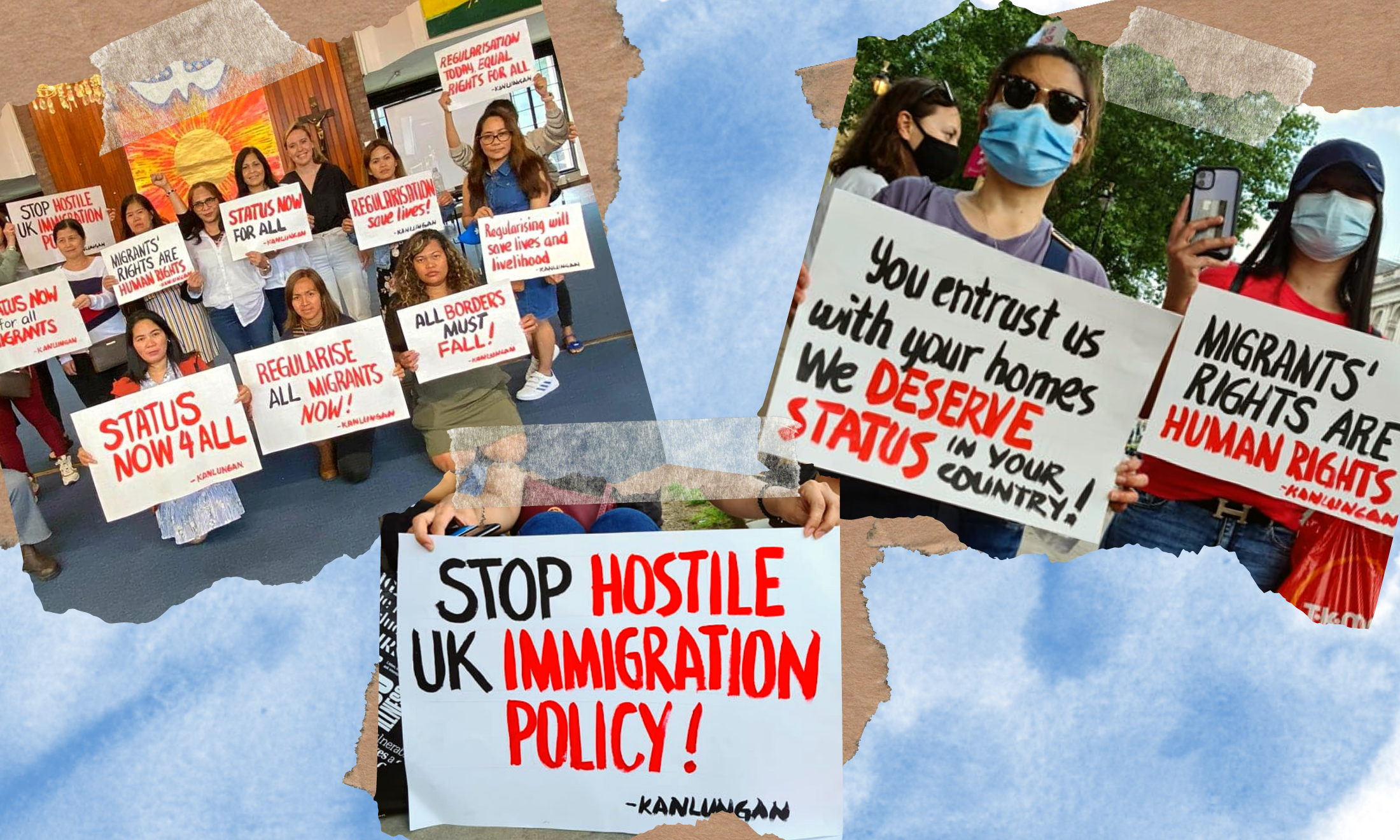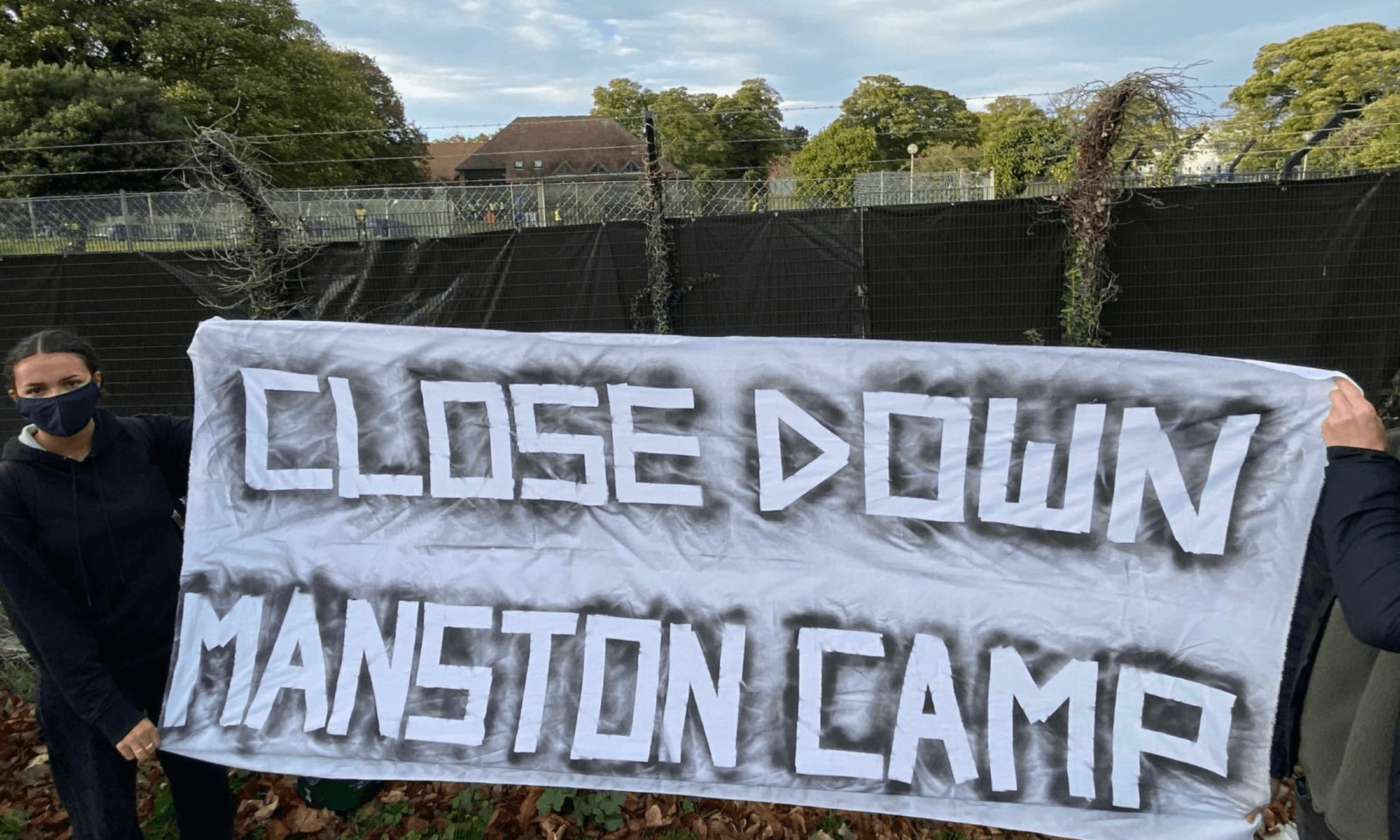
courtesy of FDWA-UK and Kanlungan Filipino Consortium
10 years, no rights: why the Government must reinstate the pre-2012 Domestic Workers visa
Migrant domestic workers have been denied fundamental rights in the UK for a decade. Change is long overdue.
Phoebe Dimacali and Francesca Humi
06 Apr 2022
Content warning: this article contains mention of abuse.
Phoebe Dimacali is a domestic worker from the Philippines and Chairperson of the Filipino Domestic Workers’ Association (FDWA-UK). Francesca Humi is the Advocacy and Campaigns Officer at Kanlungan Filipino Consortium providing immigration casework for undocumented migrants, including domestic workers.
Every year, around 20,000 Overseas Domestic Worker visas are issued to migrant domestic workers who enter the UK from outside the EU with their employers as sponsors for whom they work inside their households. 6 April 2022 marks a decade since Theresa May revoked the Overseas Domestic Workers (ODW) visa concession, removing hard-won rights for domestic workers – ushering in the start of the notorious hostile environment policy.
The concession allowed migrant domestic workers to switch employers, register these changes with the Home Office, and apply for extensions of stay and settlement. With the change to the visa in 2012, stays are limited to six months and migrant domestic workers have become tied to individual employers as sponsors, often compared to the kafala system prevalent in the Gulf region, which many workers face prior to arriving in the UK. Domestic workers on the ODW visa can no longer freely switch employers – even in cases where a worker is a victim of modern-day slavery or human trafficking – and have lost their right to long-term settlement in the UK.
Filipino Domestic Workers Association (FDWA-UK) is a grassroots organisation for and by Filipino women working as domestic workers in the UK, established in response to the 2012 change in visas. It is a member of Kanlungan Filipino Consortium, which provides immigration advice and mental health and welfare-related support for Filipino migrants including survivors of human trafficking and modern-day slavery. As frontline support providers to migrant domestic workers, we know first-hand that these workers face systematic labour exploitation and a heightened risk of human trafficking, which the change in legislation has only exacerbated.
“As frontline support providers to migrant domestic workers, we know first-hand that these workers face systematic labour exploitation”
Every month, the FDWA-UK rescues a dozen domestic workers from abusive employers. Kanlungan and FDWA-UK receive weekly requests from traumatised domestic workers in urgent need of immigration advice, emergency accommodation, and welfare support. The workers we support are predominantly young women who have left the Philippines to work in private, wealthy households in Gulf countries, Hong Kong or Singapore to send remittances back home to support their families. Many describe difficult working conditions that worsen after being brought to the UK by their employers, where they have no knowledge of support available to them locally.
The vulnerability of migrant domestic workers through the current ODW visa cannot be overstated. A survey conducted in 2019 by the Voice of Domestic Workers found that:
- 77% of migrant domestic workers experienced physical, verbal or sexual abuse;
- 51% reported that they were not given enough food;
- 61% were not given their own space in employers’ houses.
These numbers reflect the experiences of FDWA-UK members. Domestic workers that we support tell us they didn’t know where they were going before landing in London. As one FDWA member shared in a 2020 BBC London report, she travelled to the UK with her employer, without access to her passport, and then was subject to physical and verbal abuse until a fellow Filipino domestic worker rescued her. Many feel helpless about their situation after they escape, without the right to settle or work in the UK due to the restrictive terms of their visas – their only source of support and joy is the community they find through organisations like FDWA-UK and Kanlungan.
The current ODW visa effectively transforms migrant workers into commodities with little consideration for their needs or rights. Alongside other organisations working to empower migrant domestic workers, we are calling for a return to the pre-2012 ODW visa and demanding better protection of the labour rights of domestic workers.
Just last month, the Government accepted the Low Pay Commission’s recommendations that live-in workers should no longer be excluded from the National Living Wage and will put forward secondary legislation to Parliament to make these recommendations into law, based on testimony provided by members of Kanlungan and FDWA-UK. This is a welcome and long overdue sign that the chronic exploitation of domestic workers is finally being addressed and taken seriously.
“The current ODW visa effectively transforms migrant workers into commodities with little consideration for their needs or rights”
But still, there needs to be a firm commitment to the enforcement of labour law when it comes to domestic work, especially when abuse occurs behind closed doors – far from the eyes of regulators. This win also comes in the context of the draconian Nationality and Borders Bill, Part 5 of which further curtails the rights of survivors of modern-day slavery and human trafficking. Last month, the government refused to consider a proposed amendment to the bill (Amendment 70A, backed by JCWI, Kalayaan, Kanlungan, the Voice of Domestic Workers, and others in the sector) that called for a reinstatement of the visa, arguing that the Home Office was beginning a new round of consultations with organisations working with migrant domestic workers. This is despite the fact that Amendment 70A itself was created with direct input from said frontline organisations that know the needs and experiences of migrant domestic workers.
A reformed ODW visa is an essential first step in preventing abuse and exploitation. It must allow workers to change employers, enforce rights in the workplace, give them the option to report abuse and guarantee their rights in the workplace, renew their visas and allow them to be joined by their spouses and children – in short, giving migrant domestic workers the right to work and settle in the UK like other migrant workers.
“All migrants have a right to a life of dignity, stability, and joy”
However, we cannot stop there. For many migrant domestic workers, the impacts of the restrictive visa are only compounded by the hostile environment policy and the ongoing Covid-19 pandemic. Research conducted by Dr Ella Parry-Davies for Kanlungan on the experiences of undocumented migrants in 2020 and 2021 found that migrant domestic workers were frequently exposed to Covid-19 without adequate personal protective equipment, were without sick pay or leave entitlement, and were at risk of losing their employment and housing (for live-in workers) if they or their employers became infected with Covid-19.
We firmly believe that all migrants have a right to a life of dignity, stability, and joy – regardless of their immigration status or how they arrived in this country. The call from migrant domestic workers is simple: you entrust us with your houses, your children, your elderly – isn’t it time we were granted basic rights in this country? We call on the Government to reinstate the Overseas Domestic Workers visa. Domestic work is work. Migrants’ rights are human rights.
If you or someone you know has been affected by human trafficking, modern-day slavery, or exploitation, you can contact the Modern Slavery and Exploitation Helpline: 08000 121 700.
If you are a migrant domestic worker who needs urgent support with your current immigration or employment situation, please contact:
- FDWA-UK via Facebook: https://www.facebook.com/fdwauk/
- Kanlungan: 020 3893 1871 and info@kanlungan.org.uk
- FDWA and Kanlungan are also working on a new project providing direct support for migrant domestic workers, find out more here.
Kung ikaw o may kakilala ka na biktima ng human trafficking, pang-aalipin, o pang-aabuso, pwede mong kontakin ang Modern Slavery and Exploitation Helpline: 08000 121 700.
Kung ikaw ay migranteng domestic worker na nangangailangan ng agarang suporta sa kasalukuyan mong sitwasyon sa immigration o sa trabaho, maaari mong kontakin ang:
- FDWA-UK via Facebook: https://www.facebook.com/fdwauk/
- Kanlungan: 020 3893 1871 and info@kanlungan.org.uk
- Ang FDWA at Kanlungan ay kasalukuyang may proyekto at program sa pagbibigay ng direktang tulong o suporta para sa mga migranteng domestic workers, alamin ang detalye dito.
To keep up to date with our campaign to reinstate the pre-2012 visa and ratify the International Labour Organization Convention No. 189 on Domestic Workers:

Tragedies like the Knowsley riot and Brianna Ghey’s murder show scapegoating minorities is a deadly game

All the bad bills the Tories are pushing through this year

Shut down Manston camp, and take the rest of the UK’s violent immigration system with it






